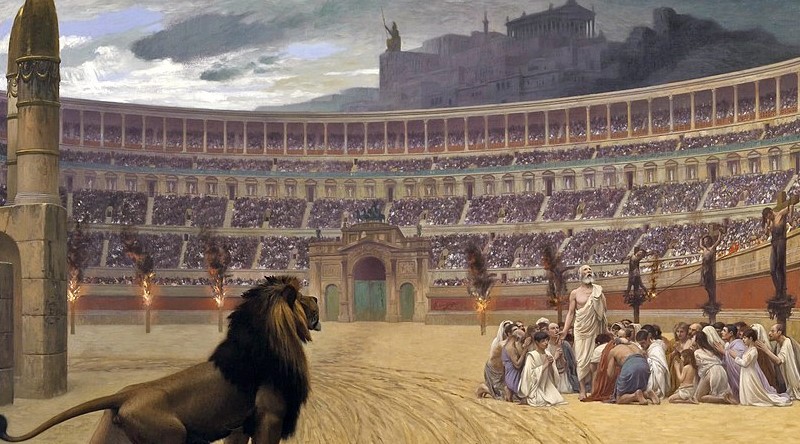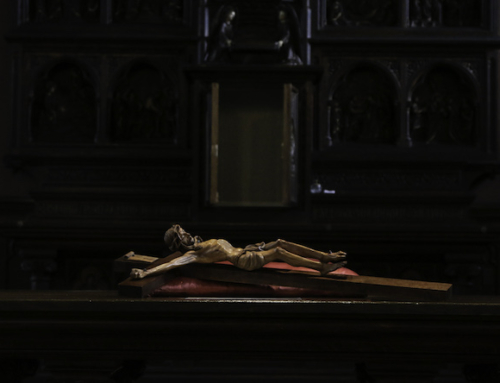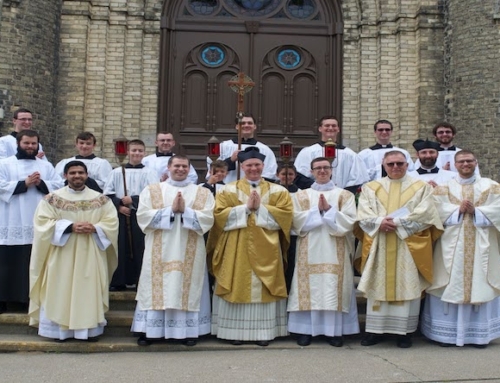The Roman Colosseum. In many ways, it represents the pinnacle of fallen man’s thirst for spectacle, violence, and glory. By the mere whim of the crowd, a man could rise to the heights of fame or wind up dead in the dust. And yet, that same Colosseum is holy ground, soaked in the blood of the earliest martyrs of Christendom. There, we venerate the men, women, and children who gave up their lives as testimony to the unsurpassable love of Christ. And though today we are not given up to actual wild beasts, often we do find ourselves in our own arenas. Temptations assail us, people try us, and often the struggle seems meaningless. We all want to be that triumphant gladiator, beloved by the crowd, who lives from glory to glory and who cannot die. But that is not the way of Christ, and the martyrs attest to it: in our personal colosseums, the only way to true victory is through a surrender which leads to death and life anew.
In the personal colosseum, we encounter fear, shame, and insecurity. Every day is full of questions: What if I say or do the wrong thing? What if I am misunderstood or judged? What if I am condemned, even for speaking the truth? But the reality of the Christian life is that it is impossible to avoid misunderstanding and persecution. Look at the early Christians, brought to the Colosseum as a scapegoat for the emperor’s destruction of Rome, put on display in all their suffering. Should this be surprising? Christ himself endured being stripped of his garments before the crowd. He was given no privacy or mercy, but was lifted up before all.
Coupled with fear and shame is our awareness of suffering, sorrow, and death in this life. Sometimes it all seems meaningless. “What has a man from all the toil and strain with which he toils beneath the sun? For his days are full of pain, and his work is a vexation; even in the night his mind does not rest. This also is vanity” (Eccl 2:22–23). Why does God allow disaster, heartbreak, and loss? I imagine that those early Christians asked themselves similar questions when young children were crucified alongside their parents. And yet, our accounts of the early martyrs reveal not despair, but hope. Christians sang hymns on their way to death and rejoiced to join their Savior. How was this possible in the face of such irrational hatred and violence?
The answer lies in the mystery of surrender, of total self-gift: “He who loses his life for my sake will find it” (Matt 10:39). Christ’s own life witnesses to this complete surrender. He pours everything of himself out on the Cross, and the early Christians desperately desired to emulate that sacrifice. Saint Ignatius of Antioch, whom we celebrate today, wanted nothing to inhibit his total surrender to Christ. He writes to the Church at Rome before his martyrdom, “Now it is the moment I am beginning to be a disciple. May nothing seen or unseen begrudge me making my way to Jesus Christ. Come fire, cross, battling with wild beasts, wrenching of bones, mangling of limbs, crushing of my whole body, cruel tortures of the devil—only let me get to Jesus Christ!” (St. Ignatius, Letter to the Romans). He realized that nothing in this world could compare to the eternal riches of heaven. And in his surrender to death, he won the eternal crown of life.
The Colosseum represents for us the inescapable fear, suffering, and death awaiting us in our fallen world. As disciples of Christ, we are brought to the Colosseum whether we like it or not. To emerge victorious from that perilous arena we must surrender all fear, all thought of winning on our own terms, all desire for self-preservation. For, when we are emptied, God fills us with grace beyond our imagination. It is only when we lose our life, that we find it. Then we, too, will enter our colosseum singing hymns of praise to God.
✠
Image: Jean-Léon Gérôme, The Christian Martyrs’ Last Prayer







